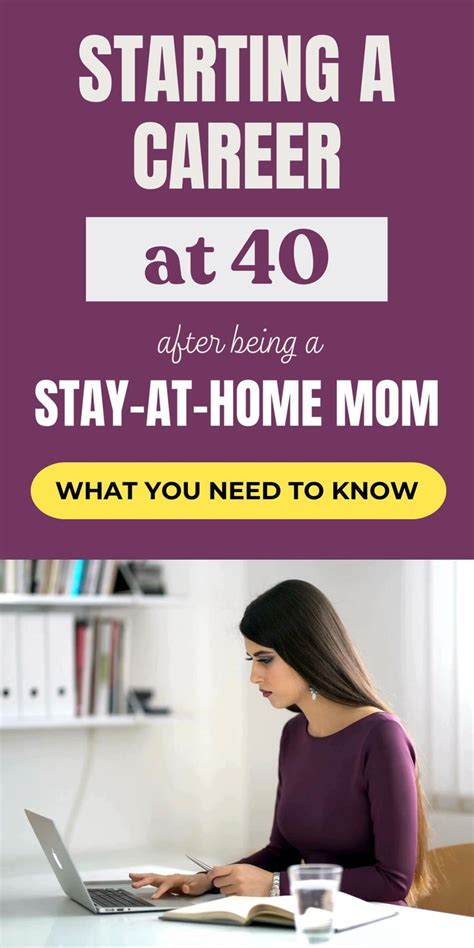Embracing a New Chapter with Renewed Purpose
The decision to re-enter the workforce after years of being a stay-at-home mom can be both exhilarating and daunting. While the prospect of pursuing a new career path may seem overwhelming, it can also be an incredibly rewarding experience. With proper planning and a positive mindset, women over 40 can successfully navigate this transition and find fulfilling employment.

Assessing Skills and Interests
The first step in launching a new career is to assess your skills and interests. Consider the following questions:
- What are my strengths and areas of expertise?
- What tasks did I enjoy performing while being a stay-at-home mom?
- Are there any transferable skills I can leverage from my previous experiences?
Identifying your strengths and interests will help you narrow down your career options and identify fields that align with your skillset.
Education and Training
Depending on your career goals, you may need to pursue additional education or training. Consider the following options:
- Online degree/certificate programs
- Community college courses
- Workshops and webinars
- Internships/apprenticeships
Education and training programs can provide you with the essential skills and knowledge necessary for success in your new career.
Researching Career Options
Once you have a better understanding of your skills and interests, it’s time to research potential career options. Explore job boards, network with professionals in your field, and attend industry events. Consider the following factors when evaluating career options:
- Salary and benefits
- Job growth prospects
- Industry trends
- Work environment
- Company culture
Understanding the job market and the specific requirements of different roles will help you make an informed decision about your career path.
Networking and Building Connections
Building a strong professional network is crucial for career success. Attend industry events, join professional organizations, and connect with individuals on LinkedIn. The people you meet can provide you with valuable information, insights, and job leads.
Overcoming Challenges
Re-entering the workforce after a career break can come with its share of challenges. However, with determination and resilience, you can overcome these obstacles:
- Time constraints: Prioritize and delegate tasks to manage your time effectively.
- Balancing work and family: Establish boundaries and communicate your availability with your employer and family members.
- Lack of confidence: Embrace your skills and experiences. Remember that you have a unique perspective and a valuable contribution to make.
- Age discrimination: Focus on your strengths and the value you bring to the table. Seek support from organizations like the AARP for guidance and resources.
Strategies for Success
To maximize your chances of success in your new career, consider the following strategies:
- Set realistic goals: Don’t expect to jump into a high-level position overnight. Start small and gradually work your way up.
- Be flexible: Be open to different roles and responsibilities. Your skills and experience may be transferable to other fields.
- Stay positive and persistent: Don’t give up if you don’t get your dream job right away. Keep applying and networking.
- Seek support: Reach out to family, friends, and mentors for encouragement and guidance.
Conclusion
Starting a career at 40 after being a stay-at-home mom can be a transformative experience. With careful planning, education, and determination, women over 40 can successfully re-enter the workforce and find fulfilling employment. By leveraging their skills, embracing new challenges, and building a strong support system, they can unlock their potential and achieve professional success.
Appendix
Table 1: U.S. Bureau of Labor Statistics Labor Force Participation Rates
| Age Group | Labor Force Participation Rate |
|---|---|
| Women 45-54 | 77.3% |
| Women 55-64 | 60.6% |
| Source: U.S. Bureau of Labor Statistics |
Table 2: AARP Survey on Women Returning to Work
| Question | Response |
|---|---|
| Percentage of women who have returned to work after a career break | 77% |
| Top motivators for returning to work | Financial need (42%), desire for personal fulfillment (39%) |
| Biggest challenges faced by returning women | Lack of confidence (32%), age discrimination (27%) |
| Source: AARP Survey on Women Returning to Work |
Table 3: Top Industries for Women Returning to Work
| Industry | Percentage of Women |
|---|---|
| Healthcare | 29% |
| Education | 21% |
| Retail | 16% |
| Administrative/Office Support | 12% |
| Source: Catalyst Study on Women in Business |
Table 4: Useful Resources for Women Returning to Work
| Resource | Description |
|---|---|
| AARP Work Reimagined | Provides resources, programs, and support for women over 50 who are considering returning to work. |
| National Career Development Association | Offers career counseling, training, and networking opportunities for job seekers. |
| CareerOneStop | Provides a comprehensive website with job search tools, career planning resources, and training programs. |
